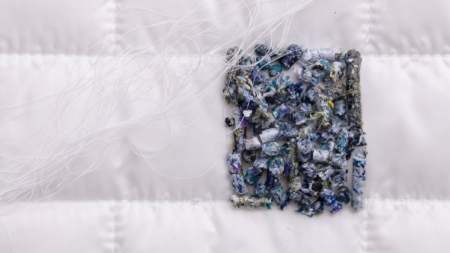Polyester
85% of Patagonia’s polyester this season is recycled. Using recycled polyester, rather than virgin petroleum polyester, reduced our seasonal carbon emissions by over 5,600 metric tons of CO₂e.
Polyester isn’t made from a single material. It’s actually a polymer made from carbon molecules that can be manipulated in various ways depending on the intended use. Polyester can be made from sugar or from petroleum. It can be recycled if the waste stream that it’s coming from is homogenous and free of impurities, like food scraps or dirt. It can be used to create insulation for clothing or for buildings. And, when blended with natural fibers, it can yield stronger, more water and abrasion-resistant fabrics. Everything from jackets to bags to canoes to the finish on pianos is made from polyester.
We use recycled polyester in 80 percent of our products, a process that started in 1993 when we created the outdoor industry’s first fleece from recycled plastic soda bottles. Then we converted the face fabrics in all of our shells to recycled materials. Now all of our Capilene® and synthetic insulation styles are made with some percentage of recycled material. We use it a lot, and we’re continually looking for ways to improve the way it performs. One of the places where we’ve done the greatest amount of experimenting is with polyester insulation.
The origins of polyester insulation can be traced back to the early 1980s, when the US Army Research Laboratory was looking for a material that could compensate for the drawbacks of down, which was used in sleeping bags and outerwear at the time. To this day, down remains the most packable, comfortable and lofty insulation available, but it doesn’t keep you warm when it’s wet or withstand prolonged exposure to bad weather. The material that was eventually created for the US Army was a nonwoven polyester called PrimaLoft® ONE, which was made available to the general public in 1990.
Since then, everyone, including us, has worked on ways of manipulating polyester to adjust its properties for synthetic insulation. Unlike down or wool, polyester can be altered at the chemical level to achieve various structures depending on what the insulation is eventually intended to do. For instance, if you’re moving around a lot in cold weather and also sweating, you need a jacket that’s lightweight, breathable and stretchy like the Thermal Airshed (87% recycled polyester shell with 100% recycled insulation). If you’re going to be outside for days on end in variable and frigid weather, you’ll want one of our DAS® styles (100% nylon shell with 75% recycled polyester insulation), which are now lighter weight and more compressible while being the warmest synthetic insulation we make.
As of now, synthetic insulations are reasonably well-rounded; but so far, none of them have achieved that cozy downlike feeling. The one that comes closest is PlumaFill. To develop this insulation, we partnered with a materials supplier to create polyester fibers that mimic the structure of down while keeping the warm-when-wet properties of synthetic. It’s managed to fool a few testers, but we’re still working on the perfect substitute for down.

